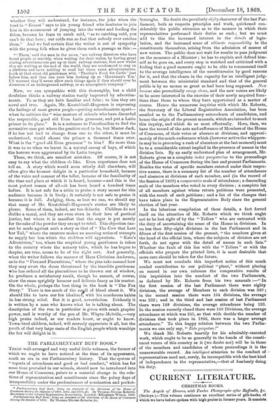THE PARLIAMENTARY BUFF BOOK..
THESE well-arranged and very useful little volumes, the former of which we ought to have noticed at the time of its appearance, mark an era in our Parliamentary history. That the system of -"reports of attendance and good or bad conduct," which has for some time prevailed in our schools, should now be introduced into our House of Commons, points to a material change in the rela- tions of representatives and constituents since the palmy days of irresponsiblity under the predominance of nomination and pocket- • Parliamentary Buff Book ; being an Analysis of the Divisions of the House of Commons during the Sessions of 1866, 1867, and 1868, de. By Thomas Nicolas Roberts, Secretary to the Liberal Registration Association. London: Effingham Wilson. 1869. Parliamentary Buff Book; being an Analysis of the Divisions of the House of Commons during the Session of 1860. By Thomas Nicolas Roberts, &c. boroughs. No doubt the peculiarly shifty character of the last Par- liament, both as respects principles and work, quickened con-
siderably the public attention as to the manner in which their
representatives 'performed their duties as such ; but we must add to this the increased interest in the details of legis- lation, and the increased sense of ultimate responsibility in the
constituents themselves, arising from the admission of masses of new voters. The public does not wait for results to pass judgment on the measures of a Minister ; he has to explain and defend him- self as he goes on, and every step is watched and criticized with a feeling that a good measure ought to be able to recommend itself
to the average intelligence of the constituencies by good reasons for it, and that the chasm in the capacity for an intelligent judg- ment between the ministerial standard and that of the general public is by no means so great as had been long supposed. New brooms also proverbially sweep clean, and the new voters are likely to be more interested in the exercise of their newly acquired func- tions than those to whom they have appertained as a matter of course. Hence the numerous inquiries with which Mr. Roberts, the Secretary of the Liberal Registration Association, has been assailed as to the Parliamentary antecedents of candidates, and hence the origin of the present manuals, which are intended to meet this inquiry, and which do so most effectually. Here, then, we have the record of the acts and sufferance of Members of the House of Commons, of their votes or absence at divisions, and approxi- mately of the much-endurance which (however active the whippers- in may be in procuring a rush of absentees at the last moment) must be to a considerable extent implied in the presence of names in the division lists. By an easily understood plan of arrangement, Mr. Roberts gives us a complete index purgatories to the proceedings of the House of Commons during the last and present Parliaments. Besides the votes of specific members entered under their respec- tive names, there is a summary list of the number of attendances and absences at divisions of each member, and (in the record of the Session of 1869) a comparative scale of attendance ; a descending scale of the members who voted in every division ; a complete list of all members against whose return petitions were presented, with the result of such petitions ; and a list of the changes that have taken place in the Representative Body since the general election of last year.
In the laborious compilation of these details, a fact forced itself on the attention of Mr. Roberts which we think ought not to be lost sight of by the " Tellers" who are entrusted with the duty of• ascertaining the sense of the House in divisions. In no less than fifty-eight divisions in the last Parliament and in fifteen of the first session of the present, "the numbers given at the head of the official lists, where the subjects of division are set forth, do not agree with the detail of names in such lists." Whether the fault of this lies with the " Tellers " or with the officials who prepare the printed lists, it is most desirable that more care should be taken for the future.
We must not conclude this imperfect notice of this much needed contribution to our political "plant," without placing on record in our own columns the comparative results of this inquisition into the conduct of the two Parliaments, as deduced by Mr. Roberts from his two manuals :—" In the first session of the last Parliament there were eighty divisions, the average of Members to each division was 240 ; in the second session there were 164 divisions, the average was 222 ; and in the third and last session of last Parliament there were 168 divisions, the average attendance being 193. In the session recently closed there were 160 Divisions, the average attendance at which was 245, so that with double.the number of divisions that took place in 1866, there was a larger average attendance." To this happy relation between the two Parlia- ments we can only say, "Estoperpetua 1" We thank Mr. Roberts heartily for his admirably-executed work, which ought to be as generally in the hands of the consti- tuent voters of this country as it (we doubt not) will be in those of the members and candidates of whose proceedings it is the unanswerable record. An intelligent attention to the conduct of representatives need not, surely, be incompatible with the best kind of independence in the representative,—that of fearlessly doing his duty.






































 Previous page
Previous page